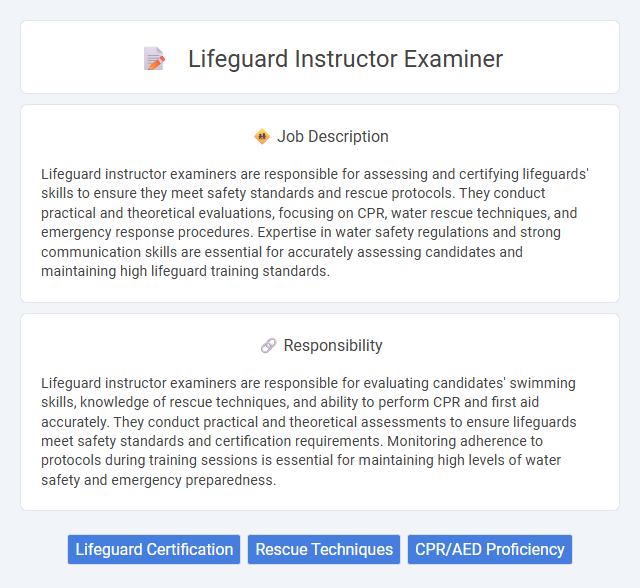
Lifeguard instructor examiners are responsible for assessing and certifying lifeguards' skills to ensure they meet safety standards and rescue protocols. They conduct practical and theoretical evaluations, focusing on CPR, water rescue techniques, and emergency response procedures. Expertise in water safety regulations and strong communication skills are essential for accurately assessing candidates and maintaining high lifeguard training standards.
Individuals with strong swimming skills and a passion for water safety are likely suitable for a lifeguard instructor examiner position. Those who remain calm under pressure and possess effective communication abilities may excel in evaluating and training lifeguard candidates. People with physical endurance and attention to detail have a higher probability of thriving in this role.
Qualification
Lifeguard instructor examiners must possess current lifeguard certification and significant experience in water safety and rescue techniques. They are often required to hold instructor-level credentials offered by recognized organizations such as the American Red Cross or YMCA. Strong knowledge of CPR, first aid, and emergency response protocols is essential to effectively evaluate and certify lifeguard candidates.
Responsibility
Lifeguard instructor examiners are responsible for evaluating candidates' swimming skills, knowledge of rescue techniques, and ability to perform CPR and first aid accurately. They conduct practical and theoretical assessments to ensure lifeguards meet safety standards and certification requirements. Monitoring adherence to protocols during training sessions is essential for maintaining high levels of water safety and emergency preparedness.
Benefit
Becoming a lifeguard instructor examiner likely offers the benefit of enhanced credibility and professional recognition within the aquatic safety community. This role probably provides opportunities for leadership development and networking with other safety professionals. The position may also offer flexible scheduling and potential financial incentives compared to standard lifeguard roles.
Challenge
The role of a lifeguard instructor examiner likely involves significant challenges related to assessing candidates' skills under pressure and ensuring strict adherence to safety protocols. Maintaining objectivity and consistency while evaluating diverse individuals in realistic, high-stress scenarios could require advanced judgment and communication abilities. The job may demand adaptability and continuous learning to keep up with evolving safety standards and training methods.
Career Advancement
Lifeguard instructor examiners play a critical role in certifying and training future lifeguards, combining advanced knowledge of water safety techniques with leadership skills. Career advancement often leads to higher positions such as aquatic program director or senior safety coordinator, with opportunities to influence safety protocols and training standards across multiple locations. Earning certifications from recognized organizations like the American Red Cross or Royal Life Saving Society enhances professional credibility and opens pathways to specialized roles in emergency response and aquatic safety management.
Key Terms
Lifeguard Certification
Lifeguard instructor examiners play a crucial role in evaluating candidates for lifeguard certification, ensuring they meet stringent safety standards and demonstrate proficiency in rescue techniques, CPR, and first aid. These professionals assess practical skills and theoretical knowledge to certify individuals capable of maintaining aquatic safety and responding effectively to emergencies. Holding a lifeguard certification not only validates essential lifesaving competencies but also enhances employability in aquatic facilities and public safety roles.
Rescue Techniques
Lifeguard instructor examiners specialize in teaching advanced rescue techniques, including spinal injury management, shallow water rescues, and victim stabilization. They assess candidates' proficiency in performing safe and efficient rescues while ensuring adherence to safety protocols and industry standards such as those set by the American Red Cross or the Royal Life Saving Society. Their expertise helps maintain high standards in lifeguard certification programs, emphasizing practical skills and immediate response efficiency.
CPR/AED Proficiency
Lifeguard instructor examiners must demonstrate advanced CPR/AED proficiency to effectively evaluate candidates' lifesaving skills under pressure. Mastery of CPR and AED techniques ensures accurate assessment of emergency response capabilities critical for water safety certification. Continuous training in these areas enhances examiners' ability to uphold rigorous industry standards and promote public safety.
 kuljobs.com
kuljobs.com